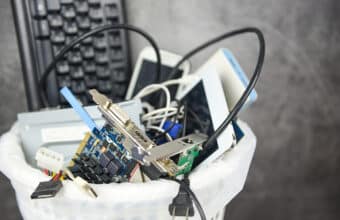Electronics Recycling
-
The True Costs of IT Asset Disposition (ITAD), Budget Planning, and Responsible Remarketing
In today’s digital landscape, organizations are increasingly recognizing the importance of secure and responsible IT asset disposition (ITAD). As IT professionals, we understand the need to protect sensitive information, preserve our customers’ trust, and promote sustainability. However, the true costs of ITAD and the potential value recovery opportunities often require careful consideration. Understanding the Costs […]
read more -
Common Questions About Computer Disposal Answered
Computers and electronic equipment drive our modern world, but as they advance and as more people rely on these devices for their everyday lives, the amount of electronics that end up in the trash only continues to increase. Huge numbers of electronic waste are thrown out each year, presenting many problems for the environment and […]
read more -
Don’t Get Burned: Why Certified ITAD Is Critical For Your Business
When it’s time to retire your used business IT equipment, ensuring compliant disposal and protection of sensitive data is essential. To achieve this, many South Dakota and North Dakota businesses turn to certified IT Asset Disposition (ITAD) vendors. But what does certification mean in the ITAD industry, and why is it so critical? Certification is […]
read more -
eWaste Statistics: Could a Potential Source of Clean Energy Be Laying Around Your Office?
As experts across the country attempt to work out a solution to the ongoing transition away from fossil fuels and other finite energy resources, it is becoming clear that a workable solution has been staring us in the face for years; our old cell phones could be a potential source of clean energy. The United […]
read more -
Electronic PHI Disposal: 3 Essential Elements to Consider
If your facility handles sensitive patient information, you are required by federal law to take reasonable safeguards to protect that information from public disclosure. These measures include an understanding of how that information is stored and disposed of. Failure to adhere to such standards can result in fines and significant reputational damage while also placing […]
read more -
How the EPA’s Plan for Battery Recycling Could Change the Future
Battery recycling is crucial for sustainable waste management, as it conserves resources and reduces environmental impact. By recovering valuable materials from batteries, such as lithium, cobalt, and nickel, we can reduce reliance on virgin materials, minimize the negative effects of mining, and create a more sustainable future. Battery Recycling Is Imperative to a Sustainable Future […]
read more -
Staying HIPAA and HITECH Compliant with Used IT Equipment
Healthcare organizations deal with a vast amount of sensitive and confidential data related to patient records, medical histories, and treatment plans. The mishandling of this data can have severe consequences, such as loss of patient trust, legal issues, and financial penalties. According to HIPAA and HITECH regulations, healthcare organizations must dispose of or resell IT […]
read more -
IT Asset Disposition vs. IT Asset Disposal: Which Is Better?
Businesses use IT equipment to store and share important information while keeping it safe from intruders. However, when IT assets are no longer needed, they need to be handled by professionals that are capable of protecting vulnerable data. Old IT assets represent a liability to companies, especially those that work with private user data. The […]
read more -
3 Signs Your Company’s Devices Are Failing and Need to Be Replaced
Device failures can be catastrophic. Not only can users lose whatever work they’ve been doing, but they can also lose important data, making it difficult to continue operations. For many businesses, failed devices can lead to unexpected downtimes and loss of profits, leaving them vulnerable to their competition. Failures can occur for many reasons, from […]
read more














